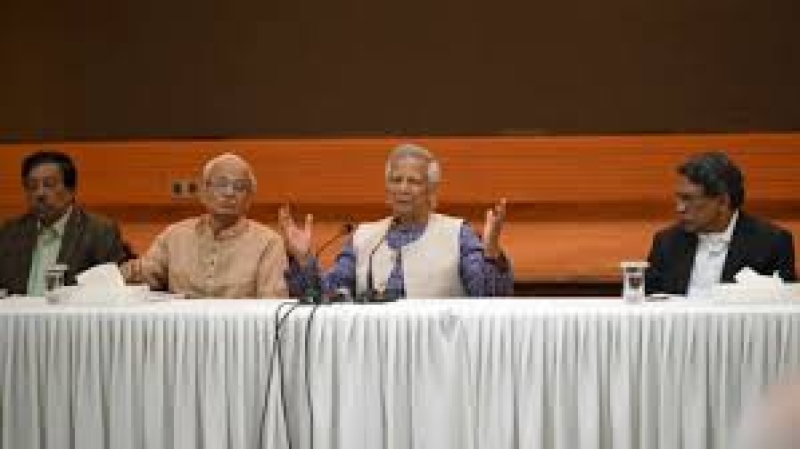- Bangladeshi Expats Cast 4.58 Lakh Postal Votes |
- IMF Forecasts Bangladesh GDP to Rebound to 4.7% in FY26 |
- Arab Allies Urge Restraint as Trump Presses Iran Talks |
- EC asks printing presses not to print election posters |
- Protect your votes, conspiracies still on: Tarique to voters |
Major Parties Call for Elections After Reforms in First Consensus Talks

In the first meeting of the National Consensus Commission on [date], major political parties emphasized the need for elections to be held after essential reforms. The meeting, which ran from 3pm to 7pm at the Foreign Service Academy in Dhaka, saw over 100 representatives from 26 political parties and alliances. Chaired by Chief Adviser Muhammad Yunus, the discussions centered around the need for structural reforms before elections.
Key groups like Jamaat-e-Islami, Gana Adhikar Parishad, and the Anti-Discrimination Student Movement, condemned what they termed “Awami fascism” and called for political reforms. They highlighted the necessity of eliminating the ruling Awami League's influence in governance.
The BNP reiterated its opposition to local government elections before national elections, with Secretary General Mirza Fakhrul Islam Alamgir stressing the need for swift consensus on reforms. Jamaat-e-Islami voiced support for positive initiatives, underscoring the importance of timely elections once reforms are agreed upon.
The Anti-Discrimination Student Movement proposed the cancellation of the Awami League's registration to make the party politically irrelevant, claiming that the ruling party's "oppressive rule" must end for the country to move forward.
Meanwhile, the Biplobi Workers Party, along with several smaller alliances, demanded national elections be held within this year. Others, including Zonayed Saki's Ganosamhati Andolon and the Labor Party, expressed preference for a national election over immediate reforms.
Ali Riaz, Vice Chairman of the Consensus Commission, confirmed that individual meetings with political parties will soon be held to discuss the reform commissions' reports, aiming for swift engagement across the political spectrum.
Earlier, on February 12, the interim government formed the seven-member National Consensus Commission to review recommendations from six reform commissions. The Commission is tasked with discussing these recommendations with political parties to reach a consensus on key political, constitutional, and electoral reforms.
During the meeting, Chief Adviser Yunus emphasized that the first phase of the interim government had ended, marking the start of political dialogue in the second phase. He urged political parties to reach a consensus on implementing the proposals submitted by the reform commissions.
Regarding the election timeline, Yunus stated that the national election could take place by December, depending on the July Charter. He explained that while some reforms could be implemented ahead of the election, others would be handled by the next government.
BNP's Fakhrul later told the media that his party hopes to reach a "minimum consensus" on state reforms to facilitate the timely organization of national elections. While the meeting was largely introductory, he reaffirmed the BNP’s position that national elections should take precedence.
Jamaat-e-Islami’s Nayeb-e-Ameer Syed Abdullah Muhammad Taher expressed support for prompt elections following reforms, stressing the importance of agreeing on necessary changes first. The party indicated that it would back any positive developments regarding reform discussions.
The Anti-Discrimination Student Movement’s Hasnat Abdullah took a stronger stance, calling for the legal ban of the Awami League, claiming that its political relevance had ended. Similarly, Nasiruddin Patwari of the Jatiya Nagorik Committee called for the drafting of a new constitution, claiming that the reform process had already begun, but the ultimate goal was constitutional change.
The meeting concluded with a commitment to further discussions, with the aim of reaching a consensus on reforms and preparing for the national election.

